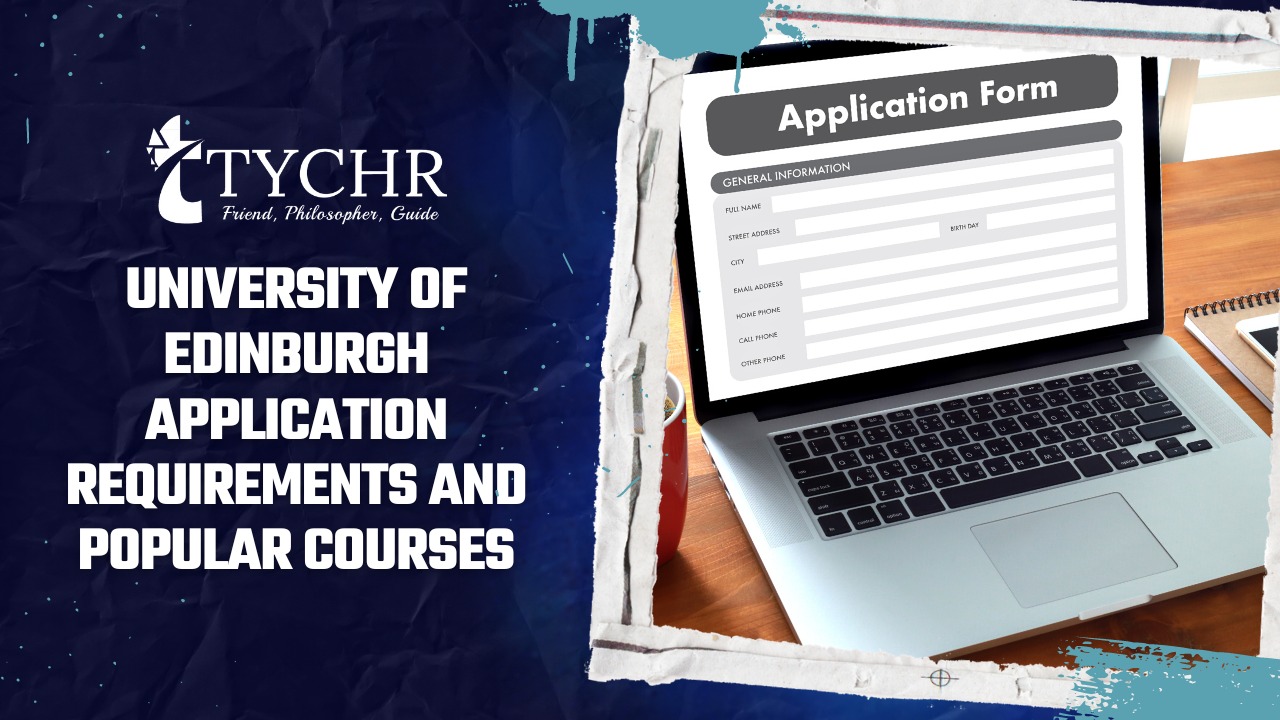Table of Contents
Choosing the right university is a crucial decision that can shape your academic journey and future career. The University of Edinburgh, with its rich heritage, renowned faculty, and vibrant campus life, stands as a prestigious institution attracting students from around the world. However, understanding the entry and application requirements is vital to ensure a successful application. In this comprehensive blog, we will explore the entry and application requirements for the University of Edinburgh, including information for various boards and the expected scores for admission. We will also provide briefs on the most popular majors at the university, allowing you to make an informed decision about your academic path.
Entry and Application Requirements:
General Entry Requirements:
The University of Edinburgh maintains high academic standards and looks for students who demonstrate exceptional abilities. While specific requirements may vary depending on the program, here are the general entry requirements:
Academic Qualifications:
Applicants should hold a recognized secondary school qualification equivalent to the Scottish Higher or Advanced Higher. For international students, the university recognizes various qualifications, such as A Levels, International Baccalaureate (IB), and other national or international qualifications.
English Language Proficiency:
International students need to provide evidence of English language proficiency through standardized tests such as IELTS or TOEFL. The specific English language requirements vary by program and can be found on the university’s official website.
Application Deadlines:
Be mindful of the application deadlines, as they may vary depending on the program and applicant’s nationality. It is important to check the university website for the specific deadlines and adhere to them diligently.
Entry Requirements for Different Boards:
The University of Edinburgh recognizes a wide range of qualifications from different educational boards. Here is an overview of the entry requirements for some common boards:
A Levels:
The typical offer for A Level qualifications ranges from AAB to AAA, depending on the program. Some programs may have specific subject requirements, and achieving high grades in relevant subjects is advantageous.
International Baccalaureate (IB):
For the IB Diploma, the university generally requires a total of 36 to 39 points, with specific subject requirements. Higher Level (HL) subjects are often considered more rigorously, and achieving 6s or 7s in HL subjects is beneficial.
Scottish Qualifications Authority (SQA) Highers and Advanced Highers:
- Entry requirements for SQA Highers are typically expressed as a single set of grades, such as AAAA. Advanced Highers may be required for certain programs, with specific grade expectations. It is essential to check the university website for detailed requirements.
Expected Scores (Scores you need to mostly guarantee admission):
The University of Edinburgh is known for its competitive admissions process due to its high academic standards and global reputation. While there is no fixed “standard score” for admission, successful candidates generally demonstrate exceptional academic achievements.
- For A Levels, the typical offer range is AAB to AAA, with some programs requiring higher grades.
- IB candidates are typically expected to achieve 36 to 39 points, with HL subjects playing a crucial role in the evaluation process.
- For SQA Highers, the specific grades required are expressed as a single set, such as AAAA.
However, it is important to note that competitiveness can vary depending on the program and the number of applications received.
Most Popular Majors at the University of Edinburgh:
The University of Edinburgh offers an extensive range of majors across various disciplines. Here are briefs on the qualifications needed for some of the most popular majors at the university:
Politics, Philosophy and Economics (PPE):
- High School Qualifications: Applicants should have strong academic qualifications, with high grades in subjects such as Politics, Economics, Philosophy, or related disciplines.
- Personal Statement: Applicants should articulate their passion for PPE and demonstrate their understanding of the interdisciplinary nature of the program. They should highlight any relevant experiences, such as participation in debates, political or philosophical societies, or engagement with economic issues.
- Critical Thinking Skills: PPE programs often place a strong emphasis on critical thinking and analytical skills. Applicants may be required to demonstrate their ability to engage with complex ideas and arguments.
Medicine:
- High School Qualifications: Applicants must have excellent academic qualifications, including high grades in subjects such as Biology and Chemistry. Specific subject requirements may vary, so it’s important to check the University of Edinburgh’s website for the most up-to-date information.
- Admissions Test: Applicants are typically required to sit the UCAT (UK Clinical Aptitude Test) or BMAT (BioMedical Admissions Test) as part of the application process.
- Work Experience: Evidence of work experience in healthcare or related fields, such as volunteering in hospitals or shadowing medical professionals, is highly valued.
Business Management:
- High School Qualifications: Applicants should have strong academic qualifications, with high grades in subjects such as Mathematics, Business Studies, or Economics.
- Personal Statement: Applicants should demonstrate their interest in business management, highlight any relevant experiences or leadership roles, and discuss their motivations for studying the subject.
- Business Acumen: Demonstrating an understanding of business principles, problem-solving skills, and an entrepreneurial mindset can strengthen an application.
Biological Sciences:
- High School Qualifications: Applicants should have a strong background in Biology, Chemistry, and other science subjects, with high grades in these subjects.
- Personal Statement: Applicants should articulate their passion for biological sciences and highlight any relevant experiences, such as laboratory work, field research, or participation in science clubs or competitions.
- Research Skills: Biological sciences programs often emphasize research skills, so showcasing any research experience or independent projects can be beneficial.
Computer Science:
- High School Qualifications: Applicants should have a solid foundation in Mathematics and Computer Science, with high grades in these subjects.
- Programming Skills: Demonstrating proficiency in programming languages and problem-solving skills is essential. Applicants may showcase their skills through personal projects, coding competitions, or contributions to open-source projects.
- Personal Statement: Applicants should discuss their passion for computer science, highlight any relevant experiences or projects, and demonstrate their understanding of the field’s impact and potential.
Also read: Top 10 European Universities Requirements For Admissions
Tuition Fees at the University of Edinburgh:
The tuition fees for undergraduate courses at the University of Edinburgh can vary depending on factors such as your fee status (UK/EU or international) and the specific program of study. For the upcoming 2023/2024 academic year, here are the general tuition fee ranges for undergraduate students:
Scottish and EU students:
- For students from Scotland: Tuition is free for Scottish students studying their first undergraduate degree.
- For students from other EU countries: Tuition fees will vary depending on the program of study. For most undergraduate programs, the tuition fee is £1,820 per academic year. However, it’s important to note that the fee status for EU students may change in future academic years due to Brexit.
Rest of UK (RUK) students:
- For students from England, Wales, and Northern Ireland: Tuition fees for RUK students vary depending on the program of study and can range from approximately £9,000 to £10,000 per academic year with it mostly being fixed at £9,250.00.The specific tuition fee for each program can be found on the University of Edinburgh’s website.
International students (outside the EU and RUK):
- For students from outside the EU and RUK, the tuition fees are generally higher. The exact fee will depend on the program of study, and it can range from approximately £24,500 to £40,000 per academic year. It’s important to note that some programs, such as medicine, may have higher tuition fees.
It’s worth noting that tuition fees can increase annually, so it’s advisable to check the University of Edinburgh’s official website or contact the admissions office for the most up-to-date information regarding tuition fees for undergraduate courses.

Applying for Scholarships:
The University of Edinburgh offers a range of scholarships for undergraduate students to support their academic journey. These scholarships are designed to recognize and reward exceptional academic achievements, talents, and contributions. Here are some of the scholarships available at the University of Edinburgh:
Edinburgh Global Undergraduate Scholarships:
These scholarships are open to international students
These scholarships are awarded to undergraduate students who have shown exceptional academic performance and have made significant contributions to their community or extracurricular activities. The scholarships aim to support students in their career development by providing financial assistance.
Edinburgh Access Scholarships:
These scholarships are available to students from underrepresented backgrounds who may face financial barriers to pursuing higher education. The scholarships provide financial support and other resources to ensure access to education for talented individuals.
Subject-specific scholarships:
There are also scholarships available for students studying specific subjects or disciplines, such as the Edinburgh College of Art Scholarships, the Edinburgh Law School Scholarships, and the Edinburgh Business School Scholarships. These scholarships recognize academic excellence and provide support for students in their chosen field of study.
To apply for scholarships at the University of Edinburgh, you will typically need to complete a separate scholarship application. The application process and requirements may vary depending on the specific scholarship and you can learn more by visiting their website.
You can also search up particular scholarships offered to students based upon their major and nationality as well using the link below:
Applying to the University of Edinburgh requires careful consideration and preparation. Understanding the entry and application requirements is crucial to ensure a successful application. By meeting the academic qualifications, submitting a compelling personal statement, and adhering to the application deadlines, you will be well on your way to pursuing your academic aspirations at one of the world’s leading universities. Additionally, exploring the most popular majors at the University of Edinburgh allows you to align your academic interests with the programs that resonate with you the most.








